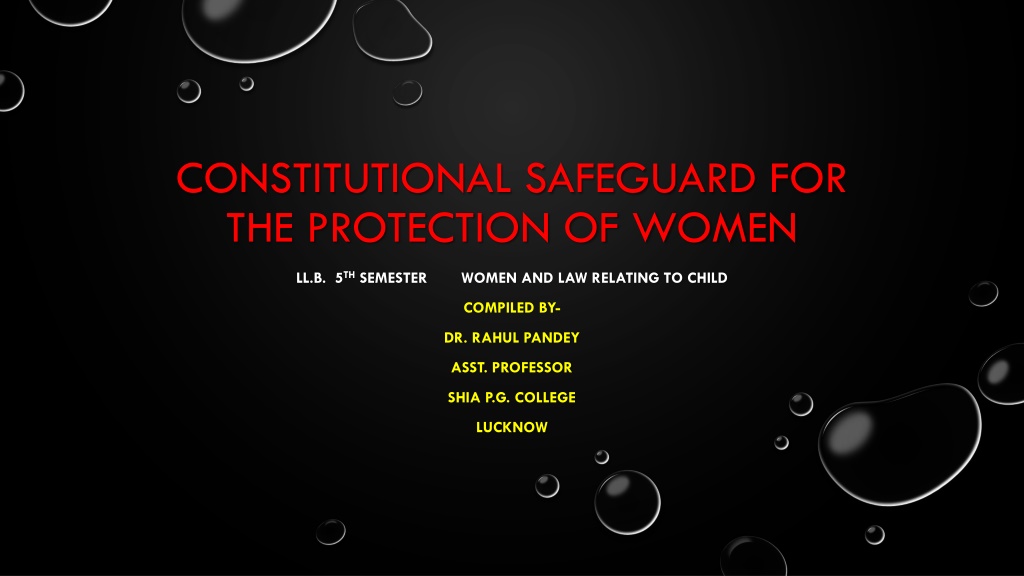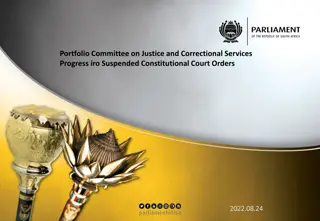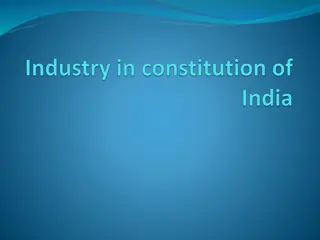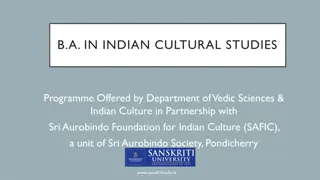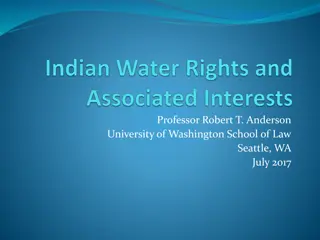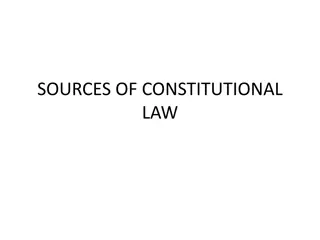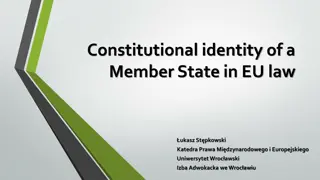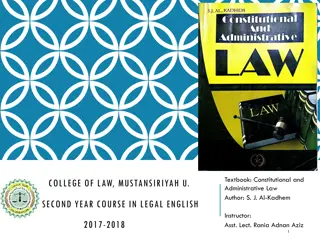Constitutional Safeguard for the Protection of Women in Indian Law
The Indian Constitution provides equality and empowerment for women through measures of positive discrimination. Gender equality is enshrined in the Preamble, Fundamental Rights, Fundamental Duties, and Directive Principles of the Constitution. Various provisions are designed for the benefit of women, ensuring their dignity, rights, and freedoms. Human rights, including those of women and girls, are integral to universal human rights. The Constitution prohibits discrimination based on gender, religion, race, caste, or place of birth, emphasizing equality and protection for all citizens.
Uploaded on Sep 25, 2024 | 0 Views
Download Presentation

Please find below an Image/Link to download the presentation.
The content on the website is provided AS IS for your information and personal use only. It may not be sold, licensed, or shared on other websites without obtaining consent from the author. Download presentation by click this link. If you encounter any issues during the download, it is possible that the publisher has removed the file from their server.
E N D
Presentation Transcript
CONSTITUTIONAL SAFEGUARD FOR THE PROTECTION OF WOMEN LL.B. 5THSEMESTER WOMEN AND LAW RELATING TO CHILD COMPILED BY- DR. RAHUL PANDEY ASST. PROFESSOR SHIA P.G. COLLEGE LUCKNOW
CONSTITUTIONAL SAFEGUARD FOR THE PROTECTION OF WOMEN The Constitution not only grands equality to women, but also empowers the state to adopt measures of positive discrimination in favour of women. The principle of gender equality is enshrined in the Indian Constitution in its Preamble, Fundamental Rights, Fundamental Duties and Directive Principles. Preamble We, the people of India, having solemnly resolved to constitute India into a Sovereign Socialist Secular Democratic REPUBLIC and to secure to all its citizens JUSTICE, social, economic and political; LIBERTY of thought, expression, belief, faith and worship; EQUALITY of status and of opportunities;
And to promote among them all FRATERNITY assuring the dignity of the individual and the unity and integrity of the Nation; IN OUR CONSTITUENT ASSEMBLY this 26thday of November 1949, do HEREBY ADOPT, ENACT AND GIVE TO OURSELVES THIS CONSTITUTION. The preamble is the key to the Constitution. It does not discriminate men and women but it treats them alike. The framers of the Constitution were well aware of inequal treatment melted out to the fair sex, from the time immemorial. Certain provisions are specifically designed for the benefit of women.
Valsamma Paul v. Cochin University, the Supreme Court held that human rights are derived from the dignity and worth inherent in human beings. Human rights and fundamental freedoms have been reiterated by the Universal Declaration of Human Rights, and they are interdependent and have mutual reinforcement. The human rights of women, including girl child, are therefore an inalienable, integral and indivisible part of universal human rights. The full development of personality and fundamental freedoms of women and their equal participation in political, social, economic and cultural life are concomitants for national development, social and family stability and growth- culturally, socially and economically. All forms of discrimination on grounds of gender are violative of fundamental freedoms and human rights.
Fundamental Rights Equality before law (Article 14). The state shall not deny to any person equality before the law or the equal protection of the law within the territory of India. Prohibition of discrimination on grounds of religion, race, caste, sex or place of birth [Article 15(1)]. The state shall not discriminate against any citizen on grounds only of religion, race, caste, sex, place of birth or any of them. 15(2). No citizen shall, on grounds only of religion, race, caste, sex, place of birth or any of them, be subject to any disability, liability, restriction or condition with regard to- 15(2)(a). Access to shops, public restaurants, hotels and places of public entertainment; or 15(2)(b). The use of wells, tanks, bathing ghats, roads and places of public resort maintained wholly or partly out of State funds or dedicated to the use of the general public.
15(3). Nothing in this article shall prevent the State from making any special provision for women and children. Equality of opportunity in matters of public employment [Article 16(1)]. There shall be equality of opportunity for all citizens in matters relating to employment or appointment to any office under the State. 16(2). No citizen shall, on grounds only of religion, race, caste, sex, descent, place of birth, residence or any of them, be ineligible for, or discriminated against in respect of, any employment or office under the State.
Prohibition of traffic in human beings and forced labour [Article 23(1)]. Traffic in human beings and begar and other similar forms of forced labour are prohibited and any contravention of this provision shall be an offence punishable in accordance with law. 23(2). Nothing in this article shall prevent the State from imposing compulsory service for public purposes, and in imposing such service the State shall not make any discrimination on grounds only of religion, race, caste or class or any of them. Directive Principles of State Policy. Certain principles of policy to be followed by the state (Article 39). The State shall, in particular, direct its policy towards securing-(a) That the citizens, men and women equally, have the right to an adequate means of livelihood. Equal Justice and free legal aid (39A). The State shall secure that the operation of the legal system promotes justice, on a basis of equal opportunity, and shall, in particular, provide free legal aid, by suitable legislation or schemes or in any other way, to ensure that opportunities for securing justice are not denied to any citizen by reason of economic or other disabilities. Article 39A of he Constitution of India provides for free legal aid to the poor and weaker sections of the society and ensures justice for all. In every State, a State Legal Services Authority and in every High Court Legal Services Committee have been constituted.
39(d). The principle of equal pay for equal work for men and women embodied in Articles 39(d) of the Constitution was first considered in Kishori Mohanlal Bakshi vs Union of India in 1962. The objective of the article 39 of the Indian is to provide the guidelines and a direction to the state in terms of policy making. Provision for just and humane conditions of work and maternity relief (Section 42). The State shall make provision for securing just and humane conditions of work and for maternity relief. Uniform civil code for the citizens (Section 44). The State shall endeavour to secure for the citizens a uniform civil code thoughtout the territory of India.
The Panchayats Reservation of seats (Article 243D). Seats shall be reserved for- (3). Not less than one-third (including the number of seats reserved for women belonging to the Scheduled Caste and the Scheduled Tribes) of the total number of seats to be filled by direct election in every Panchayat shall be reserved for women and such seats may be allotted by rotation to different constituencies in Panchayat. (4). The offices of the Chairpersons in the Panchayats at the village or any other level shall be reserved for the Scheduled Castes, the Scheduled Tribes and women in such manner as the Legislature of a State may, by law, provide: 243T (3). Not less than one-third (including the number of seats reserved for women belonging to the Scheduled Castes and the Scheduled Tribes) of the total number of seats to be filled Municipality shall be reserved for women and such seats may be allotted by rotation to different constituencies in a Municipality. by direct election in every
(4). The offices of chairpersons in the Municipalities shall be reserved for the Scheduled Castes, the Scheduled Tribes and women in such manner as the Legislature of a State may, by law, provide.
CREDIT/SOURCE THE CONSTITUTION OF INDIA (BARE ACT) CONSTITUTIONAL LAW OF INDIA, DR. J.N. PANDEY, CENTRAL LAW ACADEMY, ALLAHABAD, U.P. CONSTITUTIONAL LAW OF INDIA, KHAILASH RAI, CENTRAL LAW PUBLICATION, ALLAHABAD, U.P. LAW RELATING TO WOMEN AND CHILDREN, DR. MAMTA RAO, EBC LAW RELATING TO WOMEN & CHILDREN, DR. S.C. TRIPATHI, CENTRAL LAW PUBLICATIONS, ALLAHABAD, U.P.
